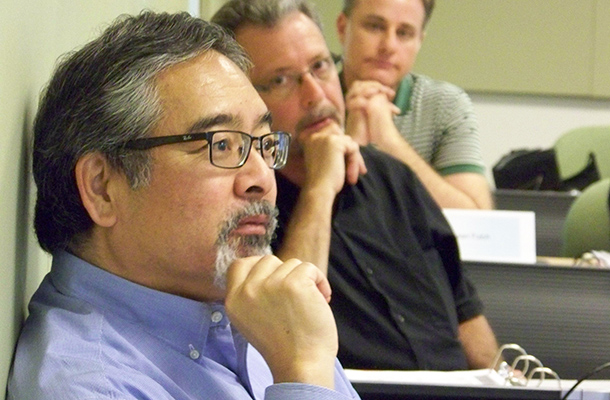
Wade Shinsato during LA Fellows class session (Photo Credit: LA Fellows)
Wouldn’t it be great if there were a GPS system for our jobs and careers? An app that – like Waze and other traffic apps warn us of traffic jams ahead – could notify us about coming career troubles and help us steer to better-paying jobs and opportunities.
That’s what Visalaya Hirunpidok says she found by taking part in an innovative workforce development “fellowship” run by the City of Los Angeles. LA Fellows not only assists the unemployed with job-search training – it also provides a distinctive volunteer community service component that could transform how workforce development programs are developed.
Visalaya’s story is one now being shared increasingly by unemployed workers of mature ages. She left a job doing marketing and business development for a law firm last year, ready not only to leave that firm, but perhaps also make a career change. But finding a new job was much more challenging than she had imagined especially because now she was over 40.
“When I was in my 20’s, I could just leave a job and not have anything in place and be able to land a new position within a few months,” said Hirunpidok. “Now I (had) waited a year and still nothing. And it’s not like I wasn’t busy looking.”
But Hirunpidok now realizes that while she was busy looking, she wasn’t doing it effectively.
“Most adults spend their time working in their jobs – they’re not used to looking for jobs,” said Allison Silver, program director for LA Fellows.
Silver says people who have been at the same job for the last ten or even five years are often not prepared to compete for a new job, particularly in the current job market. Digital technology is transforming almost every work environment. Workers who haven’t kept pace are finding themselves unprepared for new job opportunities and consequently waiting months, sometimes years, for work.
The LA Fellows, whom are selected from a pool of applicants, are trained in small cohorts during a five-week intensive course focusing on basic job-hunting skills – resume writing, job interviews and researching the job market to find the right job.
“It’s a phenomenal program. It’s almost like having a GPS for your career,” said Hirunpidok. “The instructors are amazing. They come from various industries and professions. Some of these people charge lots of money to teach these skills but we got them for free.”
“LA Fellows often call their experience in the program ‘transformational,’” said Silver. “They gain skills needed to land a job. They also develop a tool set and roadmap to use over the course of their career.”
But that wasn’t the best part for Wade Shinsato. He left a TV industry job in Washington, D.C. to come back home to L.A. – and like Visalaya – believed he’d have little trouble landing work. But also like her, the weeks turned into months and then a year went by.
“I was getting depressed,” said Shinsato. “It didn't seem that there was anything out there that interested me, had adequate compensation, or I felt they were asking for skills I did not have. I also didn't have anyone to talk to, nor did I have the energy to ask for help at career centers.”
Once Shinsato was accepted into LA Fellows he says he quickly embraced it.
“It’s not just a classroom. It’s a fellowship,” said Shinsato. “They welcomed class interaction. They let the class direct the conversations. We all found out we’re not alone – that the obstacles we were running into, others were too. And it didn’t matter what field. We all had those same fears and motivations and we all helped each other.”
And for Shinsato, it connected him to public service in a way he didn’t even know he was searching for. This is the element of LA Fellows that is distinct from other workforce development and job training programs: Fellows are required to spend 100 hours with a nonprofit, using their skills to support the community.
“I found that when I was volunteering, working with people with disabilities, supporting them to believe themselves, to be independent, I got great joy out of that,” said Shinsato.
Even after completing the Fellows program recently, Shinsato is still working for the nonprofit and is busy on a project that will not only provide employment but also a new career direction.
“I know I can take my skills from before and apply them to do something different. That’s new for me,” said Shinsato. “This is why I was always buttonholing myself in the past. I knew I had other skills but wasn’t sure how to do something.”
For workforce development leaders like California Community College Vice Chancellor Van Ton-Quinlivan, programs that are designed to get displaced workers back to work fast are part of the solution to California’s workforce needs.
“It’s a tough place to be when you lose your job. Finding a new one fast is critical,” said Ton-Quinlivan. “Short-term training aimed at reskilling and getting workers back on their feet and into employment is key.”
Doug Marriott, director of workforce training at Los Angeles Valley College in Valley Glen, which hosts the Fellow program, says the program works precisely because it’s different.
“LA Fellows is unique to workforce development and provides benefits not only to participants, but to our nonprofit community as well,” said Marriott. “We have added a 'Strengthening Working Families' component over the last year to provide the option of counseling and information from our Family Resource Center. We know that supporting individuals to employment impacts their families and communities and believe in developing a holistic approach to our work.”
Hirunpidok added that even rejections were helpful to her and she learned from all of her experiences while in the program.
“LA Fellows taught me to turn lemons into lemonade,” said Hirunpidok. “There should be one of these programs in every city!”

